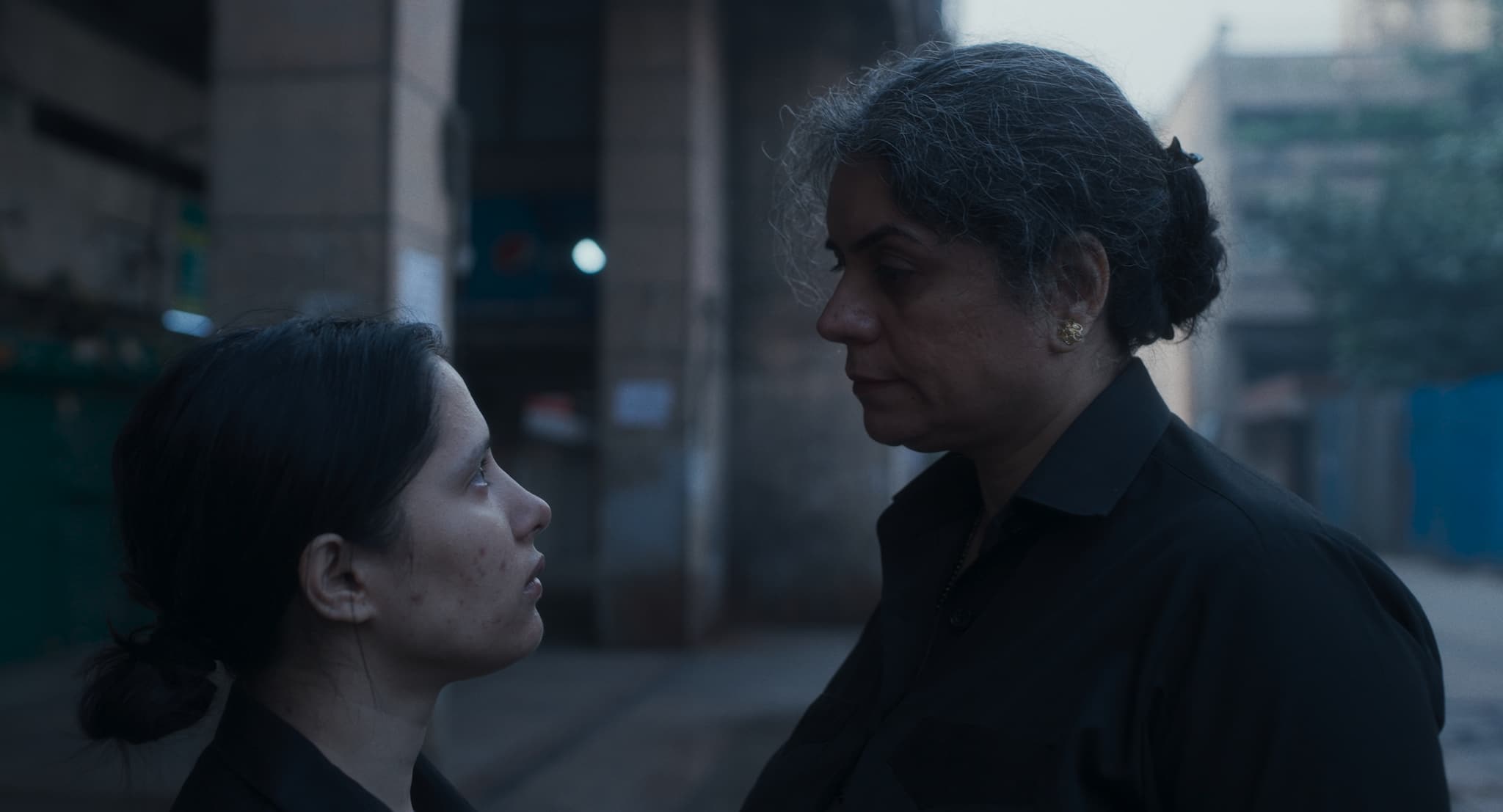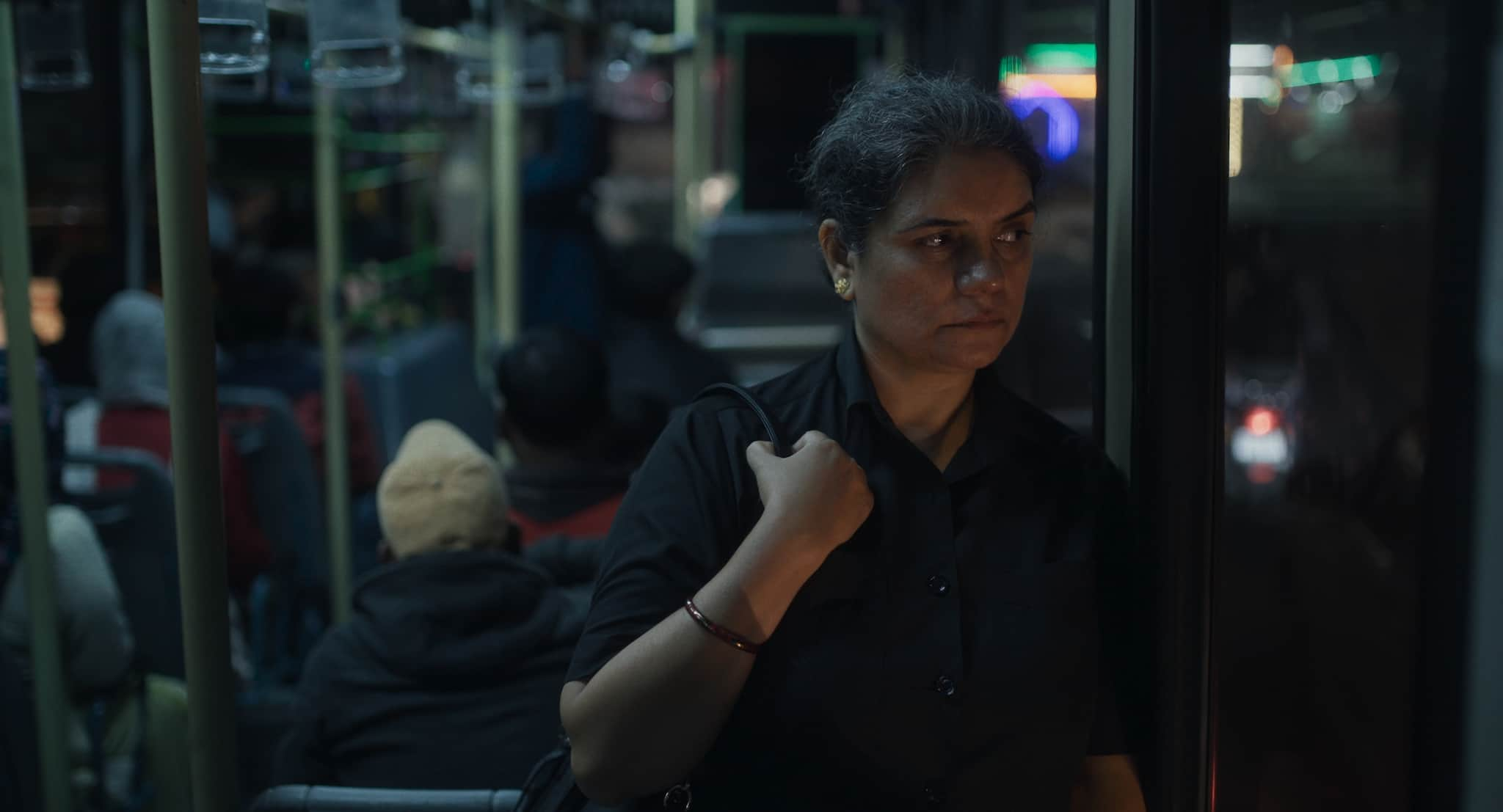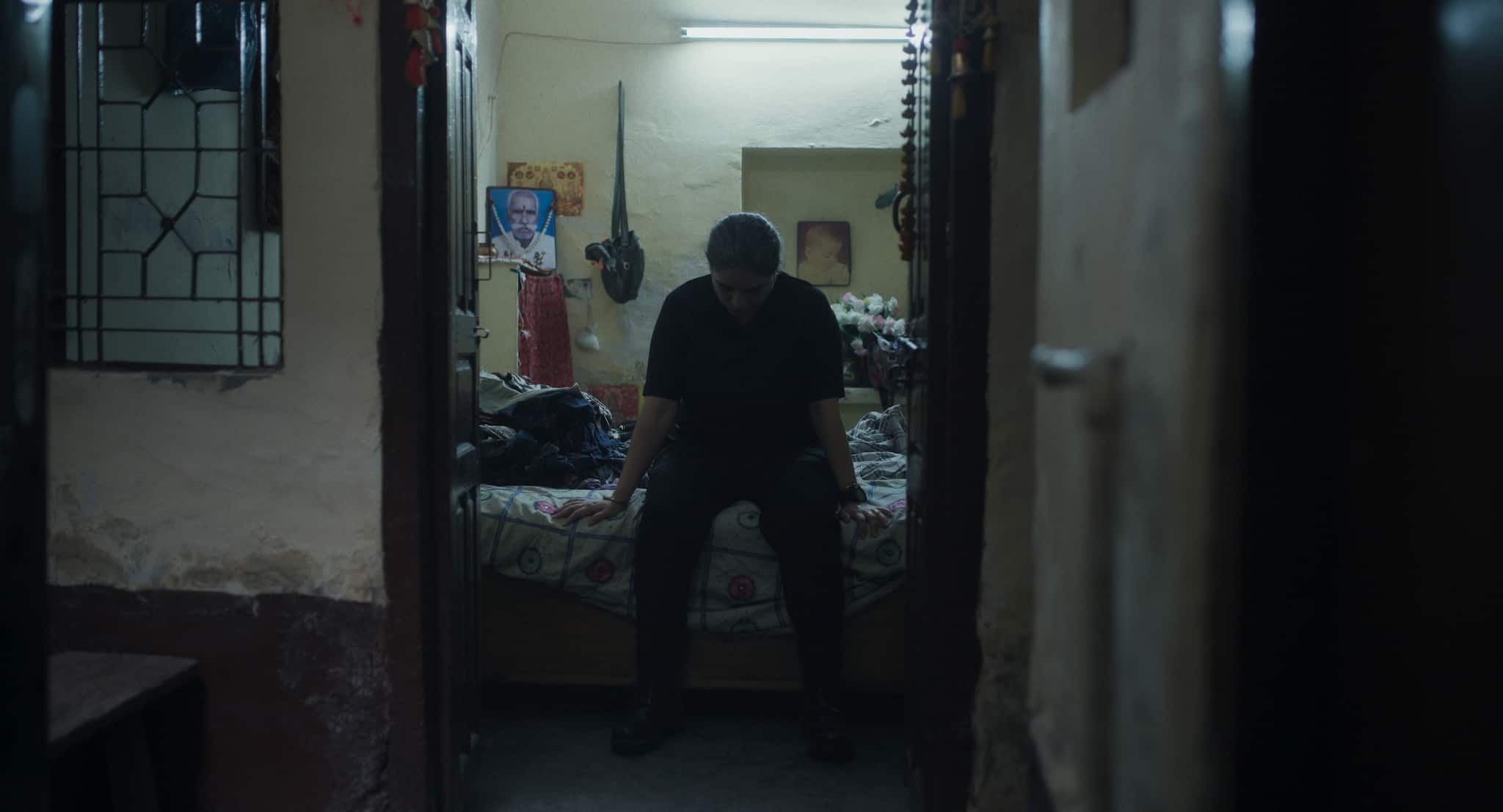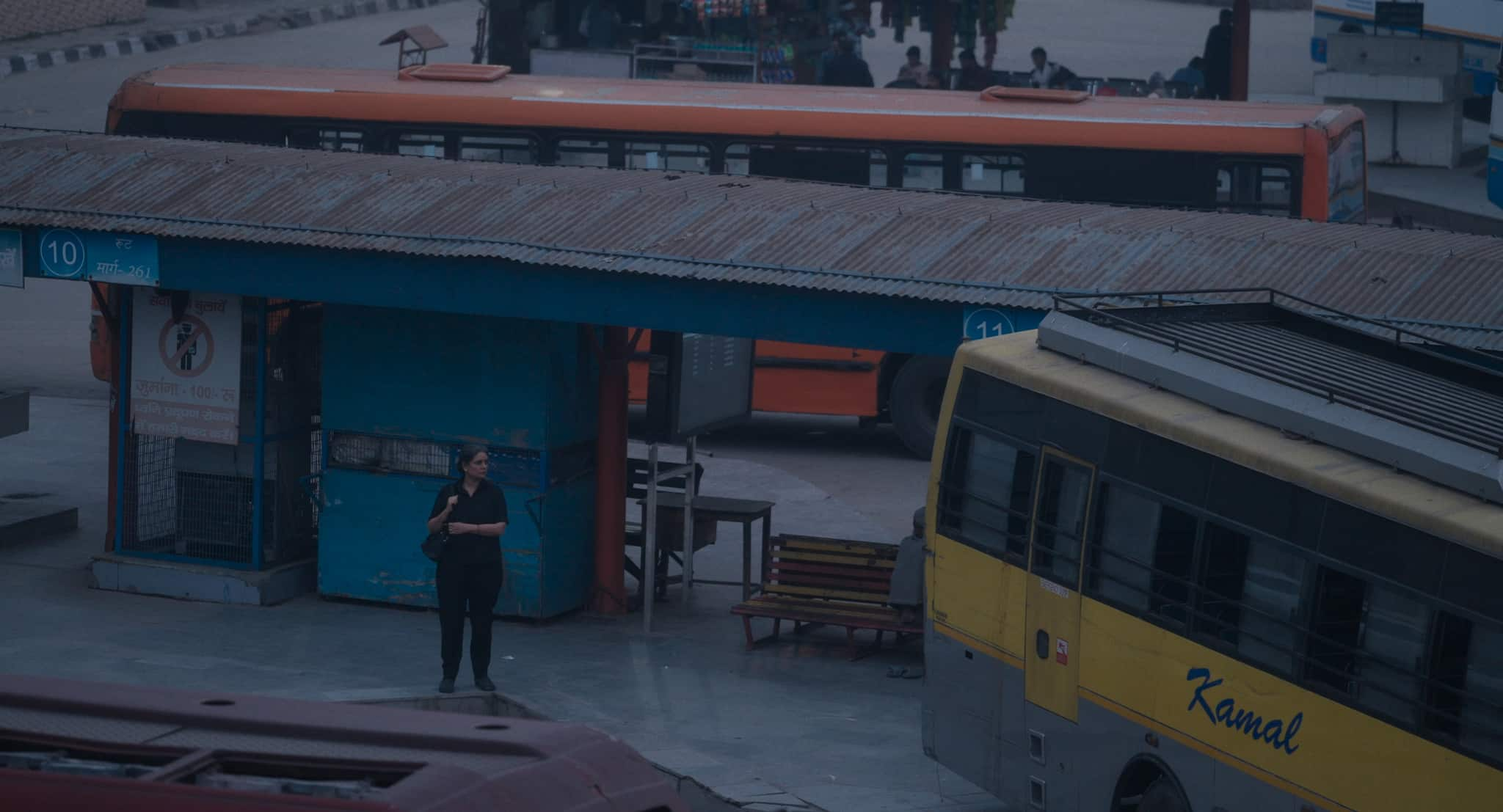



What does a cinematographer do when he dons the director’s hat? He makes a film about cameras. But here is a probe into the dark side of cameras. Udit Khurana’s Taak, which is a mid-length film about female bouncers, Delhi nightlife, and a surveillance state, premiered in Focus South Asia segment at the ongoing MAMI Mumbai Film Festival and next goes to Dharamshala International Film Festival (DIFF).
Jyoti Dogra’s Shalini works as a bouncer at a Delhi nightclub. She takes another girl from her village, Ambika Kamal’s Komal, under her wings. Each has a past she’s running from. Khurana creates a claustrophobic, dystopic and apocalyptic world with gloomy, narrow bylanes, where houses are cheek by jowl, and clusters of tangled electric cables stay suspended in air, where a single woman waits at the Bus terminal hemmed in by buses, replace the bus with social mores, expectations, and rules and it would make for a hostile image. Khurana, aurally and visually, creates a sense of trap out in the open. The blue filters work as an extension of the mind of the people who inhabit this story — of a working class and migrant women workers and their invisible lives, of women engaged in a traditionally male profession that is less talked about, of women providing safety to women in a world that is unsafe and hostile to them. In all of this, Khurana also evokes that unsaid dynamics women share, beautiful, of camaraderie and hostility, of misunderstanding and having the other’s back, of shielding the other, perhaps, seeing one’s own reflection in the other, Jyoti Dogra’s Shalini and Ambika Kamal’s Komal reminded me of senior cop Kalpana (Saloni Batra) and her junior Soni (Geetika Vidya Ohlyan) from Ivan Ayr’s Soni (2018).
 Ambika Kamal and Jyoti Dogra (right) in a still from 'Taak'.
Ambika Kamal and Jyoti Dogra (right) in a still from 'Taak'.
Delhi University-graduated Khurana, a 2023 Berlinale Talent, is known more recently for helming the lens for the Marathi film Ghaath, which premiered at Berlinale in 2023 and recently ran in theatres, a unique Adivasi film made by a peron with Adivasi roots Chhatrapal Ninawe. From the real forests of Chhota Nagpur region in Ghaath to the clustered urban concrete jungles of the metropolis, Khurana’s lens stays on the victims of the system, those who are being watched, who lead borrowed, unmoored lives in rented rooms, having escaped one personal reality for another.
 A still from Taak.
A still from Taak.
If you haven’t seen theatre actor Jyoti Dogra on stage, you have no clue what you are missing in life. Among the first times that I saw her on screen were in the roles of a wife. In a blink-and-miss role as the wife of police commissioner Amod Shukla (Paresh Rawal) in Ram Gopal Varma’s Satya (1998) and Rajputana separatist leader Dukey Bana’s (Kay Kay Menon) wife in Anurag Kashyap’s Gulaal (2009), but it were her solo, devised performances on the stage that blew my mind. In Notes on Chai (2016) and Black Hole (2019) but most of all in her most-talked-about, most-relatable Maas (2023), in which a middle-aged Dogra takes the audience on a raw, unfiltered journey of tackling bodily shame, society’s unrealistic beauty standards, social conditioning, capitalist consumerism and the patriarchal gaze that women internalise and scrutinise themselves with. She follows Polish theatre director Jerzy Grotowski’s concept of finding performative material from the body. She finds the impulse and motivations of the character first and then performs from there. Dogra’s craft, on stage or screen, is always marked by intensity and rigour. That same approach she brings to the films, especially in Taak. On one level, both Maas and Taak are about surveillance culture and gaze-trapping of women, in professional and personal lives. And it is the individual’s body under surveillance and scrutiny in both.
Ambika Kamal, who was earlier seen in the short film Vilom (2020), puts up a solid act herself that keeps up shoulder to shoulder with Dogra in Taak, produced with Storiculture Impact Fellowship, an initiative supported by Omidyar Network India.
Taak has been edited just right and just enough by Bhamati Sivapalan, whose edited film Ek Tha Gaon (Once Upon a Village, directed by Shristi Lakhera) won Best Non-feature Film National Award last year. Taak’s title means to look or stare at; Taak could be short for taak jhaank, which means to snoop around. Taak could also mean a narrow ledge/shelf in the wall. Ledge symbolises the precarious balance between survival and disaster; being on the ledge also means to be at a crucial juncture to make a big decision.
 A still from Taak.
A still from Taak.
Through the characters of Shalini and Komal, one gets a glimpse into what could also happen to those female athletes who are thrown out of sports academies? It’s a cross to bear for life. Recent history has shown how women athletes can be celebrated one day and ostracised another. Both the women in Taak are former sportswomen, from Hisar, Haryana. Their past catches up with them. If one was a top athlete who failed a dope test and became national news, the records of which her company keeps without her knowledge, but she hangs in there because the single mother has a future athlete-son to raise; the other woman, who is perhaps a lesbian, was married into an abusive marriage with a man, when she rebelled against the repressive institution she was beaten up by her own. She refuses to wear the tracker watch that the company enforces on all the security personnel at the nightclub, to track down where they are, what they are doing, et al. The film is interwoven with CCTV footages of the club.
 A still from Taak.
A still from Taak.
Khurana’s film, in which the workplace is a microcosm for the society and countries at large, brings into question the ethics of surveillance, is it a necessary protocol of a modern society, what about one’s right to her own privacy, identity, agency? From philosopher-jurist Jeremy Bentham’s concept of Panopticon (tower to keep an eye on prison inmates), adapted in George Orwell’s novel 1984 and Franz Kafka’s The Trial, to the Big Brother is Watching Us surveillance tactics of totalitarian systems of the contemporary world, as technology develops and our phones listen in on us, as our data get digitised, linked and leaked, new techniques of surveillance which allow unprecedented collection and retention of information would — to use the title of Michel Foucault’s seminal work — Discipline and Punish.
 A still from Taak.
A still from Taak.
And, Babli Bouncer (2022) maker Madhur Bhandarkar can take a leaf from Khurana’s Taak to see that films on female bouncers don’t need to be bubbly, banal and superfluous.
Discover the latest Business News, Sensex, and Nifty updates. Obtain Personal Finance insights, tax queries, and expert opinions on Moneycontrol or download the Moneycontrol App to stay updated!
Find the best of Al News in one place, specially curated for you every weekend.
Stay on top of the latest tech trends and biggest startup news.